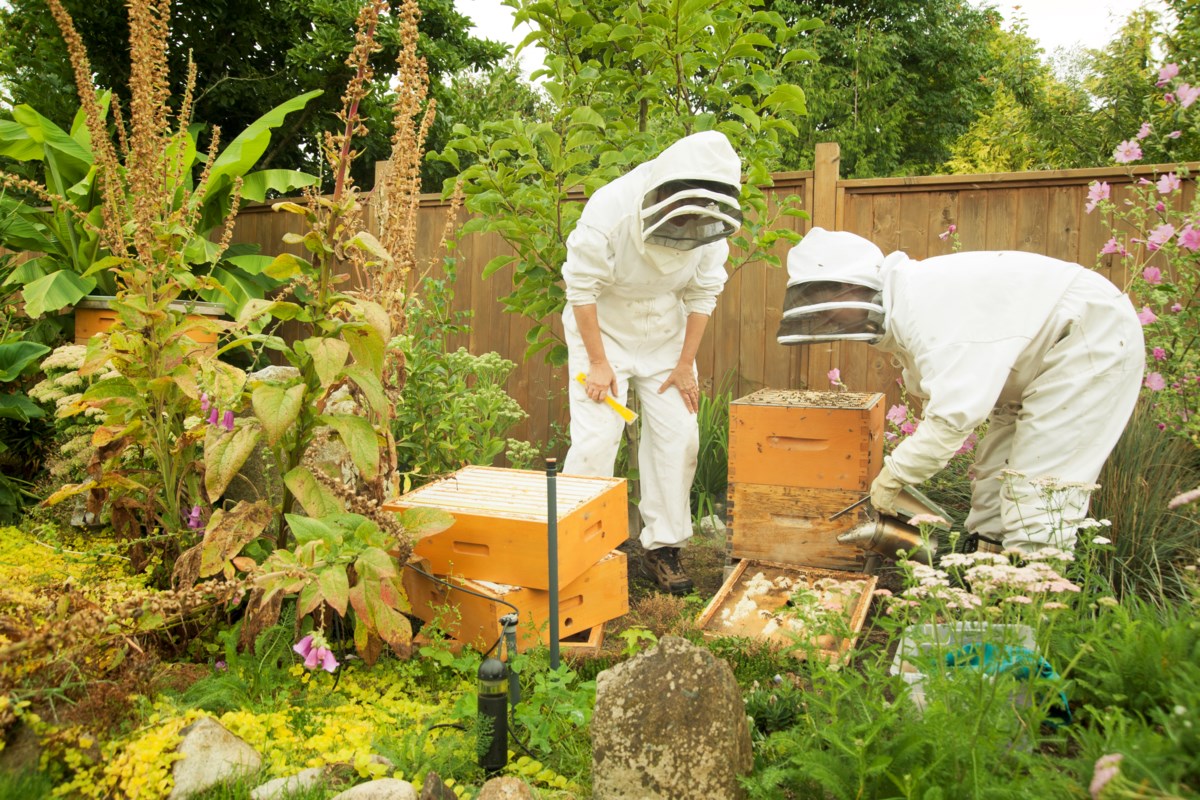A centuries-old tradition in religious orders, bees provide wax for candles, honey too
Posted: April 18, 2022


Maryanne Meyerriecks
St. Boniface parishioner Mike Elsken tends to the three bee boxes in his yard in Fort Smith on April 6. He has 11 other bee boxes on his property in Mountainburg.
Sacred Heart of Mary parishioner Mike Ferguson started beekeeping for environmental reasons, but soon learned that beekeeping can also be a spiritual practice.
“You can watch the bees all day, and they won’t bother you,” the Southwestern Bell retiree told Barling. “It’s amazing how hardworking they are. They know their purpose in life and their duty to serve. It takes 18 days for a bee to grow from egg to pupa. They feed and care for the hive for a week, then go in search of food. They live productively and peacefully in their community.
Retired St. Boniface Parish teacher Mike Elsken, who cares for three beehives in his Fort Smith garden and several others on his property in Mountainburg, Crawford County, made the same discovery.
“Last year Mike saw a swarm on a high branch in Mountainburg,” his wife Jo Elsken said. “Even though he was 75, he got a 14ft ladder, cut the branch, then sat on the ground with them, watching them gradually enter his bee box. He calls them “my ladies”.
“As bees turn nectar into honey, Catholics are reminded of their responsibility to listen to the Word of God, meditate on it, and turn it into honey of good work.”
“When I went to high school in Subiaco, the monks kept beehives,” said Mike Elsken. “The farmland makes it a perfect place for beekeeping.”
Throughout Church history, monks have been beekeepers and have found bees to be a perfect model of God’s Church, explained a 2016 article on aleteia.com. Bees live in service, working in harmony for the good of the hive. Worker bees are chaste. As bees turn nectar into honey, Catholics are reminded of their responsibility to listen to the Word of God, meditate on it, and turn it into honey of good work.
According to a 2018 Catholic News Service article, the Church also sees the bee as a role model for “Our Lady,” due to its good work habits. Saint Augustus encouraged monks to use the worker bee as a model for their vow of chastity.
Beekeeping is a centuries-old tradition in religious orders, providing the community with wax for chapel candles as well as honey.
Saint Benedict is one of the many patron saints of bees. Subiaco Abbey practiced beekeeping for many years. One of their most notable beekeepers was brother Stephen Babek, who died in 1973.
“Called by a fellow monk the ‘mechanical genius of the century’, Brother Stephen was making 1,300 candles a year for monastic liturgies,” said the abbey’s sub-prior, Brother Ephrem O’Bryan, OSB.
Dad. Elijah Owens, OSB, who recently returned to the abbey after several years of study in Rome, plans to return the abbey to beekeeping soon. When there are enough hives, Fr. Cassian Elkins, OSB, said Arkansas Catholic he expects the monks to bless the hives every year on the feast of the death of Saint Benedict, March 21, and can follow the old French tradition of attaching medals of Saint Benedict to each hive.
Pope Pius XII, in an address to beekeepers in 1948, said: “Working like bees with order and peace, men would learn to enjoy and cause others to enjoy the fruit of their labors. …Let them (men) therefore learn to enter with respect, confidence and charity into the minds and hearts of their fellow men discreetly but deeply; then they will know how, like the bees, to discover in the most humble souls the perfume of nobility and eminent virtue.
Ferguson said he also learned to appreciate simplicity by spending time with bees.
“Life is complicated if you let it be,” he said. “We have to seek Jesus to overcome this. We see ourselves as better than others, and that translates into evil. Evil must be replaced by the love of Jesus.
People can help bees survive and thrive by growing flowers without pesticides or chemicals. “Bees are smarter than most of us realize,” Ferguson said. “They are attracted to smells and colors. When flowers are sprayed with chemicals, bees stay away.
In April and May, people may notice bees swarming, which can happen when a hive gets too crowded, Jo Elsken said. Swarming bees are almost always harmless and focus on protecting the queen until they can find refuge in a new hive. Most beekeepers are happy to collect swarms of bees if told.
Although only bees produce honey, all species of bees do the important work of pollination and maintaining nature’s balance.
To learn more about bees, contact arbeekeepers.org
Please read our comment policy before posting.
Article comments powered by
 Xoven Agricultor
Xoven Agricultor



